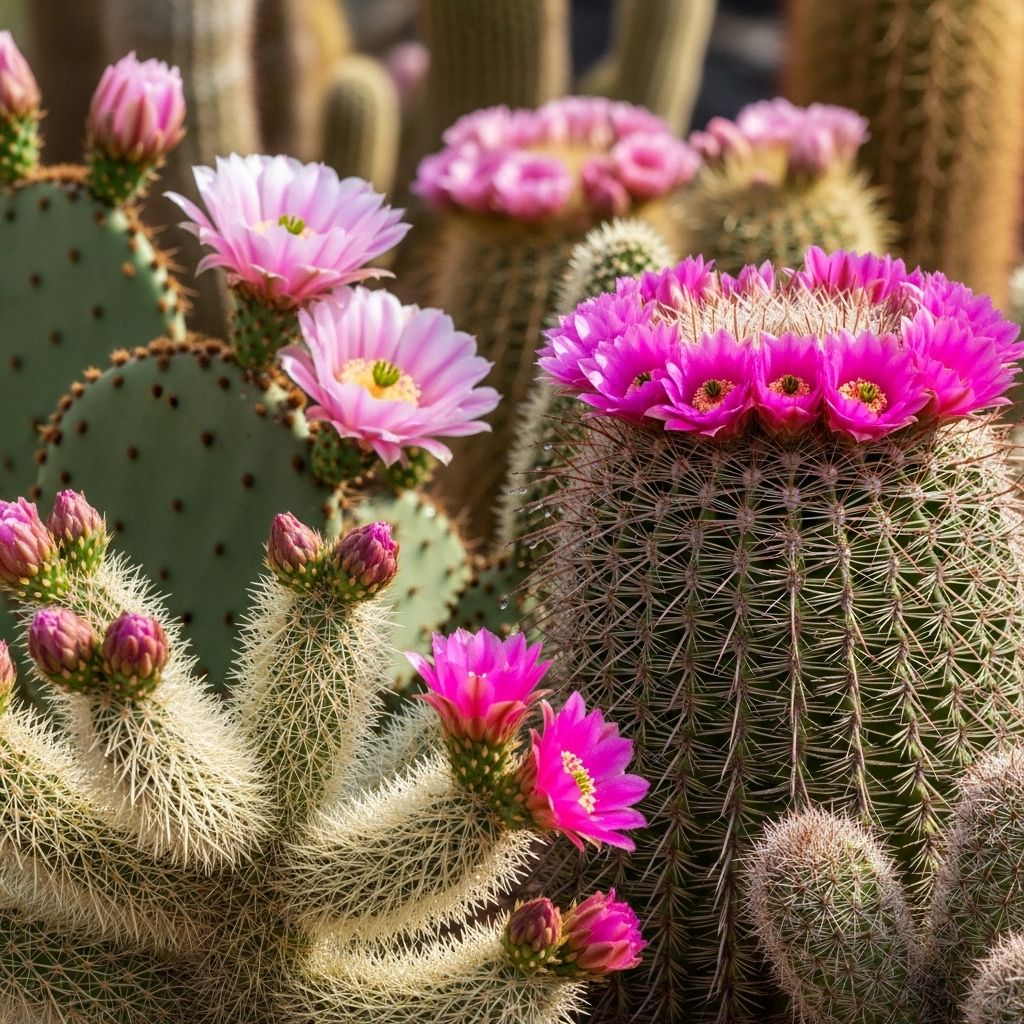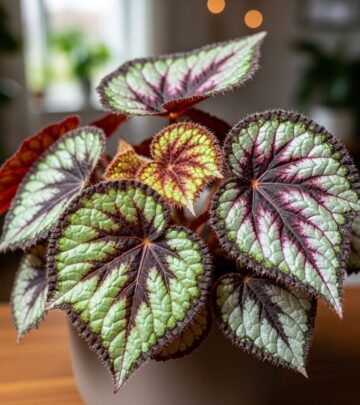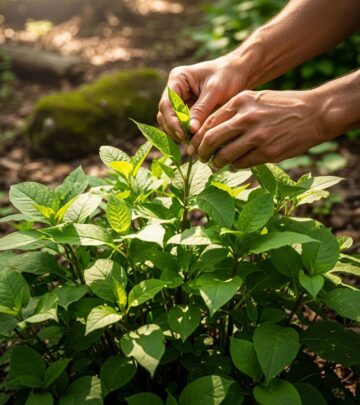Pink Flowering Cacti: 13 Stunning Plants With Pink Blooms
Discover 13 captivating cacti that produce gorgeous pink blooms, adding vibrant color to your indoor or outdoor garden.

Image: HearthJunction Design Team
13 Gorgeous Cactus Plants That Bloom with Pink Flowers
Cacti are celebrated for their unique textures and low-maintenance care, but the real magic comes when they burst into bloom. With sharp spines and soft, vivid blossoms, cacti present a dramatic contrast that makes them exceptional additions to any plant collection. While cactus flowers occur in a spectrum of hues, pink blooms stand out for their softness and subtle contradiction to the plant’s tough exterior. Below, discover 13 remarkable cactus species that deliver stunning pink blossoms and learn how to coax their best displays.
Why Choose Cacti with Pink Flowers?
- Striking Contrast: Pink blooms offer a gorgeous juxtaposition against prickly spines.
- Low-Maintenance Beauty: Most cacti thrive with minimal care, making them ideal for beginners and busy growers.
- Waterwise Wonders: Perfect for xeriscaping and drought-tolerant gardens.
- Indoor & Outdoor Options: Many pink-flowered cacti can brighten up both home interiors and garden landscapes.
Table of Contents
- 1. Mammillaria hahniana (Old Lady Cactus)
- 2. Echinopsis (Easter Lily Cactus)
- 3. Gymnocalycium mihanovichii (Moon Cactus)
- 4. Echinocereus pectinatus (Rainbow Hedgehog Cactus)
- 5. Rebutia
- 6. Epiphyllum (Orchid Cactus)
- 7. Schlumbergera (Christmas Cactus)
- 8. Echinopsis oxigona
- 9. Notocactus ottonis
- 10. Parodia herteri
- 11. Cereus peruvianus (Peruvian Apple Cactus)
- 12. Pediocactus simpsonii (Mountain Ball Cactus)
- 13. Grafted Cactus Hybrids
1. Mammillaria hahniana (Old Lady Cactus)
Appearance: Recognized for its white, woolly hairs and dense spines, the Old Lady Cactus forms compact, spherical clumps. When it blooms, expect a crown of vivid magenta-pink flowers encircling the top of the plant, typically appearing in late winter through early summer.
- Bloom Time: Late winter to early summer
- Flower Shape: Funnel-shaped, arranged in a halo
- Growing Conditions: Prefers bright light and warm temperatures (70–100°F/21–38°C) during growth. In winter, cooler temps around 40°F (4°C) encourage blooming. Avoid humidity and overwatering to prevent rot. Deadhead spent blooms for tidiness, but pruning is rarely needed.
Read more on care at Epic Gardening.
2. Echinopsis (Easter Lily Cactus)
Echinopsis species dazzle with large, trumpet-shaped flowers that range from soft blush to hot pink. Their blooms are often nocturnal, opening at night and lasting just a day or two, but they make up for brevity with sheer size and spectacle.
- Flower Size: Up to 6 inches across
- Light: Full sun to bright indirect light
- Care: Allow the soil to dry between waterings; provide a winter rest period for optimal blooms.
3. Gymnocalycium mihanovichii (Moon Cactus)
Often seen as colorful grafted specimens, the Gymnocalycium mihanovichii also produces petite, delicate pink flowers atop its rounded body. These cacti are typically grafted onto rootstock, as their vibrant tops lack chlorophyll.
- Flower Color: Soft pink, sometimes magenta
- Care: Needs warmth and shade from harsh afternoon sun. Water sparingly.
4. Echinocereus pectinatus (Rainbow Hedgehog Cactus)
This small, clumping cactus showcases pink flowers with a yellow throat, often striped with magenta. Its spines are comb-like and less intimidating than many other cacti, making it popular among collectors.
- Flower Time: Spring to early summer
- Soil: Well-draining, sandy substrate
5. Rebutia
Rebutia species are miniatures loved for their ability to flower prolifically. The blooms, often hot or pastel pink, pop up on tiny globular bodies, sometimes smothering the plant in color for weeks.
- Light: Bright, indirect light, especially if grown indoors
- Care: Tolerant of cool nights; water more during the growing season, less in winter.
6. Epiphyllum (Orchid Cactus)
Known for their spectacular epiphytic (tree-dwelling) habits, Epiphyllums boast broad, flat stems and enormous, fragrant pink to magenta blooms. Flowers often open at night or in the early morning.
- Growth Habit: Trailing, great for hanging baskets
- Water: More frequent than desert cacti; keep slightly moist
7. Schlumbergera (Christmas Cactus)
The classic holiday bloomer, this cactus graces winter windowsills with cascading pink blossoms. The flattened stem segments and ease of care make Schlumbergera a favorite houseplant.
- Flowering: Late fall to winter
- Care: Likes humidity and indirect light; water when topsoil dries
8. Echinopsis oxigona
Another stunner in the Echinopsis family, oxigona is notable for its round, ribbed body and brief but enormous pink blooms.
- Flowering Frequency: May bloom multiple times in a season
- Care: Standard cactus care; prefers a cool, dry winter
9. Notocactus ottonis
Typically yellow-flowered, this Notocactus also boasts cultivars and hybrids producing a flush of soft pink blooms, much to the surprise of gardeners.
- Light: Full sun outdoors, or very bright indoor spot
- Other Features: Tolerates rocky, gritty soils well
10. Parodia herteri
Parodia herteri develops woolly crowns from which large, showy pink flowers emerge. Its compact form makes it an appealing choice for container growing.
- Bloom Period: Summer
- Water: Allow soil to dry completely between waterings
11. Cereus peruvianus (Peruvian Apple Cactus)
Though blue-green and columnar, mature plants produce spectacular pinkish blooms, followed by edible fruits. These cacti can reach impressive heights outdoors in suitable climates.
- Light: Full sun for best flowering
- Water: Tolerant of drought; water deeply but infrequently
12. Pediocactus simpsonii (Mountain Ball Cactus)
Native to western North America, this small, cold-hardy cactus pushes out pastel pink blossoms in late spring to early summer, often just as snow melts in its native habitats.
- Cold Hardiness: Tolerates freezing temperatures
- Soil: Prefers gritty, well-draining soil
13. Grafted Cactus Hybrids
Many growers create stunning pink-flowered hybrids by grafting desirable scions onto hardy rootstocks. These hybrids often feature unusually vibrant or uniquely shaped flowers, creating eye-catching displays.
- Display: Ideal as statement houseplants
- Care: Regular cactus care; monitor graft unions for health
How to Grow and Care for Pink-Flowering Cacti
While each species has unique requirements, several care guidelines apply to most pink-flowering cacti:
- Light: Most cacti thrive in bright, indirect sunlight or partial shade. Too much strong sun can scorch, while too little limits flowering.
- Water: Water deeply and let the soil dry completely before the next watering. Overwatering is the most common killer of cacti.
- Soil: Use a well-draining cactus or succulent mix. Amend heavy soils with sand or perlite to improve drainage.
- Temperature: During growth, maintain warmth (70–100°F/21–38°C). Many cacti require a cooler, dry period to trigger blooms.
- Humidity: Keep humidity low for desert cacti. Exceptions like the Christmas and Orchid cactus appreciate more moisture.
- Fertilizer: Apply a diluted cactus fertilizer in spring and early summer, but avoid fertilizing when plants are dormant.
- Maintenance: Remove faded blooms (deadhead) for neatness. Repot only when necessary.
Common Problems and Solutions
- Overwatering: Ensure pots have drainage holes and avoid soggy soil.
- Sunburn: Acclimate cacti to full sun gradually or provide shade during the hottest part of the day.
- Pests: Watch for mealybugs and spider mites; treat with insecticidal soap if needed.
- Non-blooming: Provide a cooler, dry period in winter and avoid overfeeding.
Cactus Pink Flowers Quick Comparison Guide
| Cactus Species | Flower Color | Bloom Time | Growth Habit |
|---|---|---|---|
| Mammillaria hahniana | Magenta-pink | Late winter–early summer | Clumping, spherical |
| Echinopsis spp. | Pale to deep pink | Spring–summer | Globular |
| Gymnocalycium mihanovichii | Pale pink | Spring | Small, rounded |
| Echinocereus pectinatus | Pink with yellow center | Spring | Clumping |
| Rebutia spp. | Hot pink | Late spring | Miniature, globular |
Tips for Displaying Pink-Flowering Cacti
- Group with Contrasting Textures: Arrange with spiky, smooth, and fuzzy cacti to highlight blooms.
- Use Decorative Pots: Choose containers that complement flower colors but offer good drainage.
- Seasonal Displays: Move blossoming cacti to focal points indoors when in bloom, then return to regular locations after.
Frequently Asked Questions (FAQs)
Q: How long do cactus flowers last?
A: Most cactus flowers are fleeting, lasting from a single day to about a week, but their vibrance is unforgettable.
Q: Why isn’t my cactus blooming?
A: Non-blooming cacti may need a period of cool, dry rest in winter, more light, or may be too young. Avoid overfeeding and ensure proper light cycles.
Q: Can cacti with pink flowers grow indoors?
A: Absolutely. Many species, especially Mammillaria, Rebutia, and Christmas cactus, thrive indoors with bright light and minimal water.
Q: Are pink-flowering cacti safe around pets?
A: While the blooms themselves are usually not toxic, the spines can injure curious pets. Keep cacti out of reach if you have pets that like to nibble.
Q: How do I encourage more flowers?
A: Simulate the plant’s natural seasonal cycle: provide warmth and water in spring/summer, reduce water and offer cooler temps in winter. Good light and occasional feeding with cactus fertilizer also help.
Conclusion
Cacti with pink flowers bring a burst of joy and color, balancing drama and delicacy in every bloom. Whether you’re new to succulents or a seasoned collector, there’s a pink-flowered cactus suited to your garden or windowsill. With a little knowledge and attention, you can enjoy the striking, memorable blossoms these resilient plants offer each year.
References
- https://www.epicgardening.com/cactus-pink-flowers/
- https://www.epicgardening.com/old-lady-cactus/
- https://shop.epicgardening.com/products/cactus-flower-blend-zinnia-seeds
- https://www.tiktok.com/@epicgardening/video/6774201789047737605
- https://www.botanicalinterests.com/community/blog/types-of-succulents/
Care Tips for Pink Flowering Cacti
Watch this video for essential pink cactus care tips, including light, watering, and soil advice. Learn to help your flowering cacti thrive—enjoy now!
Read full bio of Shinta












